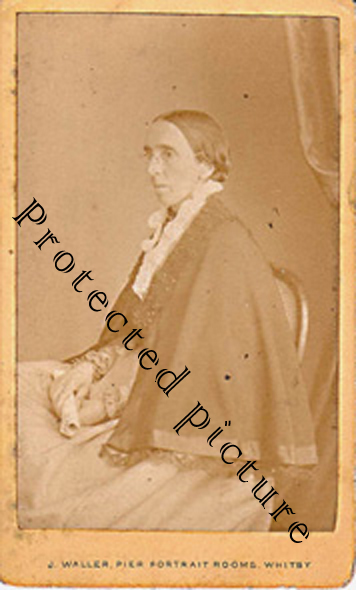TWEDDELL HISTORY.CO.UK

c.1865 Tweddell History.co.uk |
Elizabeth enters to the literary frameThe first sign of Elizabeth's entry to literary life appears when she assisted George during their stay in Bury. Another sign of her help with the work of Tweddell and Sons can be found in the 1871 census; George was away in Stokesley, leaving Elizabeth in their Middlesbrough shop describing herself as a 'saleswoman'. Around this time a wealthy Durham landowner, John Reeds Appleton of Western Hill, befriended the family, and one of his earliest acts was to propose George as a member of the 'Society of Antiquarians of Scotland'. George was elected Fellow in 1866 and the following year the 'Royal Nordic Old Language Society' honoured him with a diploma. The society was founded as a learned society in 1825, initially to study and publish the early Icelandic sagas. By the 1850s it had broadened its interest to include any language related to Danish, Icelandic, Norwegian, Swedish or any other Germanic dialect. The Cleveland dialect shows many features that betray its Danish origins, so it is no surprise that the Society had become interested in the Tweddells' work. Unfortunately, until 1951, the Society was a chauvinist club to which women were not eligible as members and could only recognise George's contribution. However, one person, who has studied the Society's work, Rikky Asher, suggests that the diploma could as much be intended for Elizabeth as for George, this being the means by which the Society sidestepped its rules. Around this time a wealthy City Durham businessman, John Reeds Appleton (1824-1889), befriended the family, and one of his earliest acts was to propose George as a member of the 'Society of Antiquarians of Scotland', elected Fellow in 1866. The following year the 'Royal Nordic Old Language Society' honoured him with a diploma. The society was founded in 1825, initially to study and publish the early Icelandic sagas, by the 1850s had broadened its interest to include any Germanic language or dialect. The Cleveland dialect shows many features that betray its Danish origins, so it is no surprise that the Society had become interested in the Tweddells' work. Unfortunately, until 1951, membership of the Society was barred to women and could only recognise George's contribution. However, one person, who has studied the Society's work, Rikky Asher, suggests that the diploma could as much be intended for Elizabeth as for George, this being the means by which the Society sidestepped its rules. Although the diploma gave only general reasons for making the award (i.e., “The Society honours a man who can and will advance its aims”), an analysis of both poets’ dialect works may offer one clue to their reasons. All are transcribed from Cleveland dialect into written form in a consistent manner, suggesting they intended to standardise it. This applies too to George’s publication of the works of the local poet, John Castillo (1792-1845) and to the collection of the poems in W.H. Burnett in his 1887 book Songs and Sketches that use the same transcription style. The latter also includes a version of the famous Lyke Wake Dirge from William Walbran’s Redcar Guide of 1848 changed to conform to the Tweddell format. An even more interesting feature of John Reeds Appleton's encouragement came towards the end of the 1860s. This coincided with the period when Elizabeth's children were becoming old enough, by the child-minding conventions of the times, for her older girls to take from her shoulders the burden of looking after the younger ones. Appleton persuaded Elizabeth to develop her creative abilities in the Cleveland dialect. In 1869 she published an important pamphlet of five short Rhymes to illustrate the North York Dialect appearing as Tractates Number 4 using her nom-de-plume name, Florence Cleveland. Demand for this led to the book by which she is best remembered, Rhymes and Sketches to illustrate the Cleveland Dialect in 1875, which included an extensive dictionary/glossary. Before long the first edition was out of print and a second edition was produced in 1892, to be the last book published by the couple. The book also had a posthumous life, for in 1914 a German philologist, Willy Klein, used this book as the basis of his study of Cleveland dialect, recording one of Elizabeth's sons, Thomas Cole Tweddell (1858-1937), on an accompanying gramophone record, and using this to transliterate the items into international phonetics. Tom Tweddell also supplied him with insights of the circumstances of the writing of his mother's book. Unfortunately, none of the known surviving books include the recordings.
From a 21st century point of view, especially a feminist one, there is evidence that the couple’s personal relationship was thought unusual during their lifetime, when middle class parents usually divided their duties strictly; the husband worked to provide money, whilst women attended to the children and domestic duties. William Andrews, secretary of the Hull Literary Society: "The common, but erroneous idea, that a woman of literary habits must be thereby unfitted for her domestic duties, is best corrected by an intimate knowledge of the life of such a woman as the wife of George Markham Tweddell, whose devotion to all that is womanly, as daughter, sister, wife, mother, grandmother, and friend - if those who know her best may be allowed to judge - has through life been as marked as the purity of her writings, a subject on which all agree." That the marriage was a close and supportive relationship was confirmed twenty years after their deaths when John Rowell-Waller chose to re-publish poems they had written in his column in the Newcastle Weekly Chronicle to demonstrate Elizabeth's strength of personality and the equality they expressed in their marriage, allowing Elizabeth to support George when he was depressed, to bring up a family successfully, yet still establish a successful literary career. |